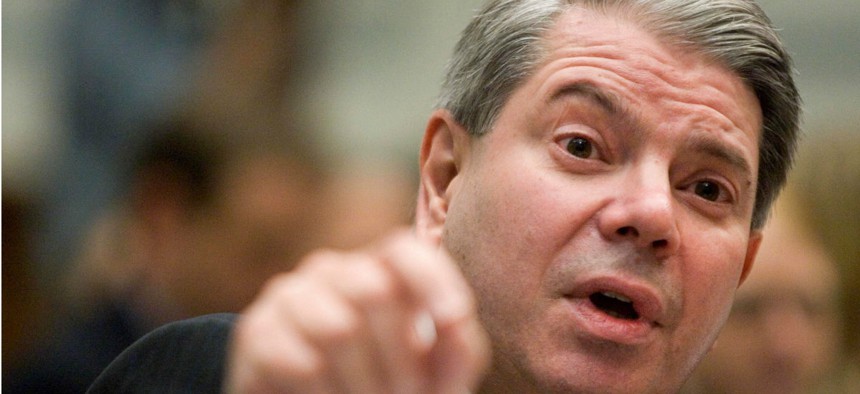VA Procurement and Security Clearance Processing Land on GAO’s High-Risk List
Hiring reform remains a key challenge and contributes to problems across government, the watchdog found.
The Veterans Affairs Department suffers from “fundamental management weaknesses and is one of the most challenged in the federal government,” Comptroller General Gene Dodaro told a Senate panel on Wednesday.
Leadership instability, high-level vacancies and a lack of accountability are all problems at the sprawling, decentralized VA, which appears three times on the newly released biennial list of high-risk programs compiled by the Government Accountability Office.
VA Secretary Robert Wilkie “has a plan but there’s not a lot of detail” for implementing GAO recommendations in such areas as the department’s outdated procurement system that relies too heavily on expensive emergency procurements, Dodaro said.
Dodaro spoke to the Senate Homeland Security and Governmental Affairs Committee, whose members are on the hunt for wasted dollars and encouraged him to speak more candidly than his staff does in the report’s tactfully worded criticisms.
Since 2006, the watchdog reported, its high-risk list recommendations have saved taxpayers $350 billion, $47 billion just in 2018, the highest financial benefits in a single year, the report noted.
This year GAO added two new program areas to the risk list: the governmentwide personnel security clearance process and VA’s acquisition management. Two other program areas showed enough improvement to be removed: mitigating gaps in weather satellite data and the Defense Department’s supply chain management.
The three backsliders, he said, are NASA’s acquisition management, the Environmental Protection Agency’s chemical oversight, and the government’s efforts to limit its liability for climate change risk.
Since the early 1990s, GAO has assessed program areas according to the criteria of leadership commitment, capacity to address the issue, action plans, monitoring and demonstrated progress.
In all this time, “seven areas improved and three regressed,” Dodaro said, while more than half of the report’s 35 areas remain unchanged.
Committee Chairman Sen. Ron Johnson, R-Wis., said the report “closely mirrors the mission statement of our committee: to enhance the economic and national security of America and promote more efficient, effective, and accountable government.” Although “so much can be put in place by agencies,” Johnson noted, he welcomed GAO’s help in “leading a horse to water in helping Congress craft legislation.” (Dodaro noted that the report flags actions recommended for Congress with asterisks.).
Ranking member Sen. Gary Peters, D-Mich., said, “We should use this report to find better ways to rein in spending and ensure we are effectively using tax dollars to address challenges ranging from cleaning up toxic chemicals and mitigating damage from climate change to strengthening cybersecurity."
Dodaro mentioned persistent problems in the areas of pension guarantees, government-backed housing loans, delays in preparing for the 2020 Census, and financial management and low morale at the Homeland Security Department.
Homeland Security, he said, has made progress, but “hasn’t adhered to its plan” for implementing recommendations in such areas as financial management and acquisition reform. “They’re down to the real tough issues,” which is partially why it is “dead last in employee satisfaction” rates. But GAO “probably has the best relationship with DHS of all agencies,” he added.
The threat of cyberattacks against military, commercial and citizen targets is one of the many risk areas that cut across agencies. Dodaro said since the White House eliminated the position of cyber coordinator, trying to find out who’s in charge in the Trump administration has been a challenge. “Similar uncertainty was expressed by his team about plans for regulation of toxic chemicals by the EPA, where the Trump administration sought to cut funds and reduce the number of chemicals to be monitored.
Dodaro criticized the Office of Personnel Management, which, he said, "still has no plan to implement” to address cybersecurity vulnerabilities since the massive personnel data breach of 2015. And, “OPM hasn’t provided enough leadership” on classification of the cyber workforce, he added, speaking to senators concerned about recruitment of information technology talent at a time when long-time employees who can operate the government’s many aging legacy systems are retiring or moving on. He said to watch for a GAO report on the topic next week.
Addressing the need for federal hiring reform, Dodaro touted the GAO’s own personnel system that decades ago moved off of the General Schedule system and shifted to “bands” that ease recruiting of specialized talent.
“That may be the most earth-shattering subject of hearings we could have,” exclaimed Sen. James Lankford, R-Okla. He encouraged Dodaro to press on with his high-risk reporting. “Make it blunt as you can,” he added, “and push back against those government people who try to edit” prose to make it more cautious.




